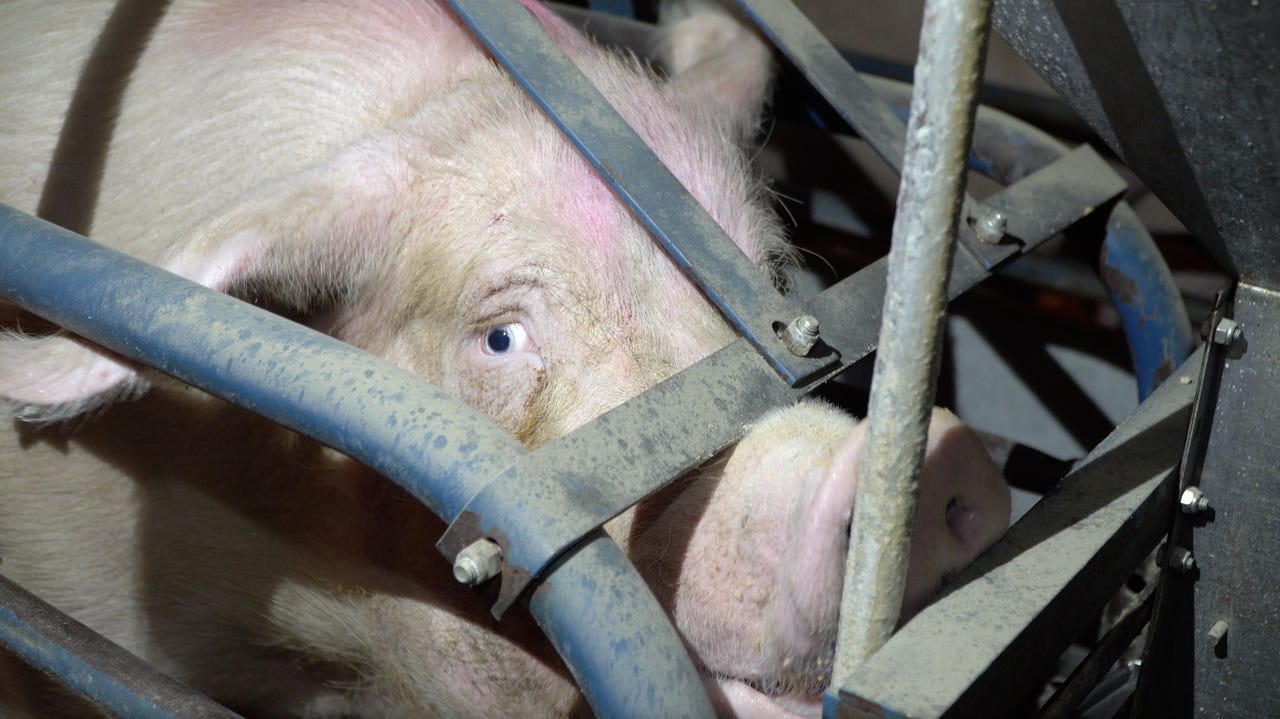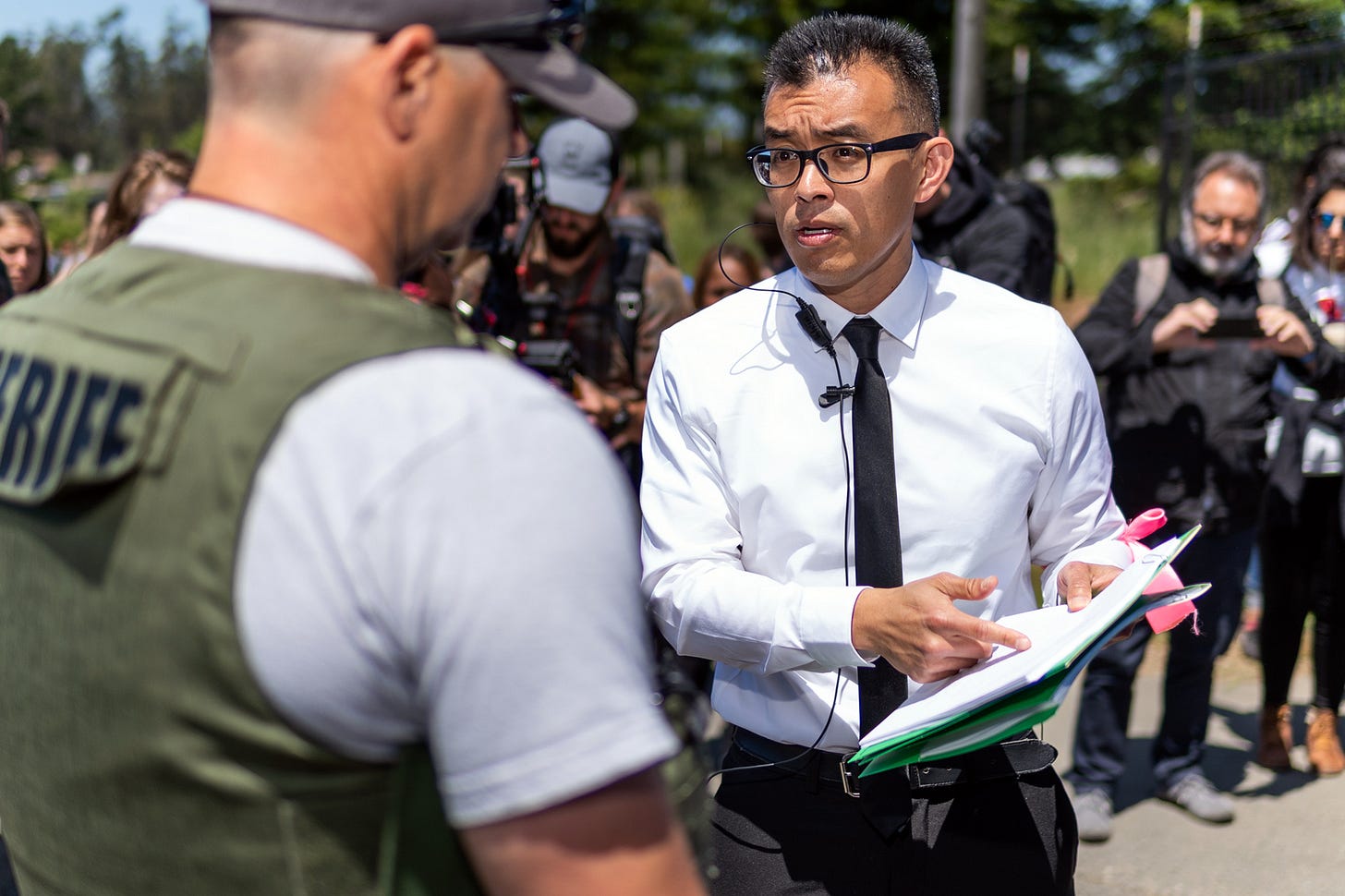Does a "Humane" Farm Even Exist?
Geography, economics, and basic defects in our legal system make a “humane” farm a practical impossibility.
On June 9, the UK-based animal rights group Animal Rising published an investigation showing that the most prominent animal welfare program in Europe is a scam. “[W]e do not allow factory farming on our scheme,” RSPCA Assured promises. Yet a majority of the 45 RSPCA Assured facilities that Animal Rising investigated were just that: factory farms. The very obviousness of the RSPCA’s falsehoods, however, may offer hope to those who want to improve animal welfare in the meat industry. The problem, an animal welfarist might say, is not the idea of humane standards but their implementation. We simply need to correct the incompetence of the RSPCA, and we’ll finally have a “humane” animal farm.
This is wrong, and I explain why in a new episode of my YouTube show.
The truth is that “humane” animal farms simply cannot exist. And there are three reasons why.
The first is that “humane” farms would require at least 80 times the available space on Planet Earth. Animal Rising’s investigation found that, even at “humane” farms, animals were crowded in filthy pens and sheds. But this is not just the result of the RSPCA’s negligence; it’s the result of the geography of the planet Earth. Eighty percent (80%) of the agricultural land on this planet is already used by the livestock industry, which produces just 17% of global calories.

Virtually all of the animals raised in this 80% of space, moreover, are already being intensively confined in factory farms, like those at RSPCA farms. These factory farms are inherently cruel; you cannot live a good life when you’re forced to live your entire life in what is, effectively, a metal tomb.
How much space would be required to make farms “humane”? The pasture-raised standards set by animal welfare certifications, which establish a minimum amount of space for animals who have regular access to the outdoors, provide one answer. The amount of space established by those standards, e.g., 108 square feet per chicken, is over 100x the one square foot of space required by the most aggressive farm animal welfare law in the nation, California’s Prop 12. That means we probably have to give at least 100 times more space to animals for their lives to be even remotely humane.
But this is geographically impossible. We are already using 80% of all agricultural land on animals. If we multiplied that space by 100x, we would need 8000% of the land on Earth, i.e. 80 Earths. We do not have 80 Earths. We have one.
The second problem is that giving animals “humane” care would bankrupt the industry. Animal Rising found countless animals who were diseased, dying, or simply rotting on the floor of RSPCA Assured farms, including a piglet they named Charlie whom they rushed to receive vet care. This is unsurprising for those of us who have seen the industry up close; it is virtually impossible to properly supervise tens of billions of animals. For example, when I was questioning Sunrise Farms owner Mike Weber in the recent Sonoma Rescue Trial, he admitted that there was only 1 employee responsible for a flock of 200,000 birds at his “humane certified” facility – a number far too low to spot sick and injured animals in the farm. But the cost of labor is too high to provide additional supervision of the farm; the result is that thousands of downed birds end up trampling each other to death every year.
Other resources, such as veterinary care, are even more scarce. For example, in the Smithfield Rescue Trial, the veterinarian for the prosecution estimated that caring for a single sick piglet would cost perhaps $100 per piglet. According to the industry’s own data, there are at least 20 million sick piglets in US farms every year, meaning that caring for one species of farm animal, and at only one narrow slice of life, would cost an additional $2 billion. The market value of those piglets is only $800 million, meaning that providing minimal veterinary care for the sick piglets would cause a minimum $1.2 billion loss! That amount, $1.2 billion, is around three times the net income of the largest pork production company in the world. Humane care for animals, in short, would bankrupt the entire food industry.
The third and most important problem with “humane” farms, however, is that animal welfare standards cannot be enforced without animal rights. Animal Rising reported its findings of cruelty to the authorities. But after more than a month, there has been zero action to rectify the 280 violations of law Animal Rising identified, including live animals with rotting heads. This is an inevitable result in our system because, as beings with no rights, animals are invisible to the law.
The shocking lack of enforcement of Prop 12, perhaps the nation’s most famous animal welfare law, is the best example of this phenomenon. While Prop 12 has been widely celebrated, and defended even by the US Supreme Court, there has yet to be a single successful enforcement action nearly ten years after Prop 12’s predecessor went into effect in 2015. When activists have attempted to report violations – and pointed to government inspection reports confirming their allegations – they have not just been ignored. They have been arrested and thrown in jail. (I know this, as I was one of them!) Never has so much ink been spilled by lawyers for so little real-world enforcement.
The broader point is that, no matter what welfare standards exist, they can easily and cheaply be ignored because there is no accountability under the law without animal rights. (Advocates for animals, even when not imprisoned, have no effective legal right to enforce Prop 12 or other animal welfare standards because we are not ourselves being harmed by violations of the standards.) Moreover, market forces will inevitably drive companies that try to comply with the standards out of business, as they will have higher costs.
But isn’t the answer, then, to simply give animals rights, so the standards can be enforced? Absolutely. But if we were to achieve rights for animals, i.e., legal personhood, the need for “humane” farms would be moot, as the farm industry would be constitutionally prohibited from taking animals’ lives. In other words, you cannot have “humane” farms without rights. But once you have rights, you don’t need “humane” farms because animals with rights cannot legally be confined and killed in the first place.
So there you have it: three reasons why “humane” farms do not and cannot exist. There isn’t enough land on Earth to raise them. There isn’t enough money in the economy to care for them. And there isn’t a functioning legal system to protect them, even if the standards were actually “humane.” The Animal Rising investigation was perhaps the most powerful concrete example of this. But the problem is more general. As I say in our new episode, if we truly want a humane animal farm, there’s really only one possibility: rescue the animals, and bring them to a farm sanctuary.
What’s up this week?
If you want to understand more deeply how Animal Rising managed to pull off the most important animal welfare investigation in the movement’s history, check out these two recent interviews with the leaders of AR. First, Dan Kidby and I had a great talk about how to mobilize a movement – including the importance of nonviolence. Second, I chatted with Rose Patterson about how AR pulled off an investigation of 45 facilities in about 4 months. The logistics are amazing!
After many years, we are bringing back one of the nation’s finest nonviolence trainers, Kazu Haga, for a workshop on September 7. I’ll be following that training with a Mass Open Rescue Experience on September 8. RSVP here. There will be some key opportunities for us to use these skills for animals in coming months. If you’re in Chicago or Denver, stay tuned as well, as we’ll be doing similar workshops in those cities – and giving you an opportunity to meet other activists who want to harness the power of nonviolence to do great things for animals!
Our new YouTube channel hit 1000 subscribers! We’re excited to bring you more content – so please hit that subscribe button and follow along. Coming up next week is another conversation with Vegan Gains – and he’s even more angry at me than he was last time (when he called me a scumbag)!




The biggest problem is the secrecy animal ag industry is allowed to operate in. There is no "humane" way to confine and kill beings who want to live. The majority of people would recognize the farcical use of the term "humane" if they were allowed (or made) to pull back the curtain.
No I don’t think there is such a thing as a humane farm.